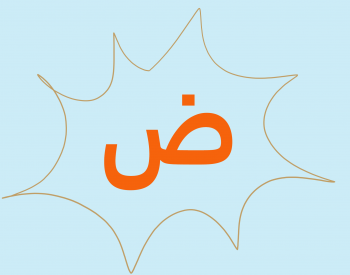Letter of the Week (ض) Dhod Posted by yasmine on May 13, 2020 in Uncategorized
Moving on to our fifteenth letter of the Arabic alphabet (ض), we will look at various words beginning with (ض) and learn why it is considered to be a very unique letter. In addition to reading a few Arabic jokes. 😄
Let’s begin with looking at your basic forms of the letter ض.
Initial ضـ, as in the word “ﺿَﺒَﺎﺏ” meaning “fog”.
Medial ـضـ , as in the word “ﻏَﻀَﺐ” meaning “anger”.
Final ـض, as in the word “ﺭَﻓَﺾَ” meaning “to refuse”.
🤔Did you know that the Arabic language is sometimes referred to as لُغَةُ الضاد “the language of Dhad”? This is because it is the only language that consists of the ض sound. This letter is also considered to be a hard letter to pronounce for Arabic language learners who also find difficulty finding a similar equivalent in their native languages. The letter ض is often explained as the “emphatic” /d/ or a sound heavier than the sound of د which is the equivalent of the letter “d” in English. To explain how to correctly pronounce the letter ض, here is an explicit video I thought would help in learning how to pronounce this unique Arabic letter.
How to pronounce ض like an Arab
Also, if you are interested in practicing your Arabic reading skills, here is a link to an article in Arabic explaining why Arabic has been called لُغة الضاد.
Before looking at the following words and phrases, can you think of words beginning with ض?
ضَروري necessary/essential .لا تُسافر خِلال هذا الوَباء إلا إذا كان ضرورياً
Don’t travel during this pandemic unless it’s necessary.
ضَريبة: tax .حاولَ التَّهَرُب مِن دَفْع ضَرائبه
He tried to get out of paying his taxes.
ضَخِم : huge .لديكَ فناء خَلفي ضَخِم لزراعة الكثير مِن الأشجار
You have a huge backyard to plant lots of trees.
ضَرَبَ: to hit .ضَرَبَ رأسه واضطر أن يَذهب إلى المُستشفى
He hit his head and had to go to the hospital.
ضَحِك : to laugh .هذهِ النُّكتة سوفَ تَجعلُك تَضحك
This joke will make you laugh.
Sometimes a joke نُكْتة can translate well into another language and sometimes it’s impossible without ruining the joke. I chose three jokes in Arabic that are simple, short, and I hope you find funny مُضْحِك.
ما هي قِمة الأدَب؟
.أن تَدُق على باب الثَلاجة قَبِل أن تَفتحها
What is the pinnacle of politeness?
To knock on the fridge door before opening it.
ما أسوأ مِن أن تأكل تُفاحة وتَجِد دودة؟
.أن تَجِد نِصفها
What is worse than eating an apple and finding a worm?
To find half of it.
Below is a good example of how a نُكْتة in one language could not work in another. As you probably know, the word for both “tall” and “long” in Arabic is طَويل. Hence, there is a play with words here using طَويل to mean “long” in the first line and understood as “tall” in the second line.
مَن أطوَل اللَيل أم النَهار؟
.أنا شخصياً في حياتي لم أراهُم واقفين جَنْب بَعض
Which is (longer/taller) night or day?
Personally, in my life I have never seen them standing beside each other.
✨Here are some more words beginning with ض.
ضَرَر:damage/harm .ليسَ هُناك ضَرَر في التأكد مِن أن الباب مُغلق
There’s no harm in making sure the door is locked.
ضَوْء: light .تحتاج هذه الغُرفة إلى تَركيب المَزيد مِن الأضواء
This room needs more lights installed.
ضَيْف: guest .لدينا ضيوف يَجلسون في غُرفة الضيوف
We have guests sitting in the guest room.
ﺿَﻌِﻴﻒ: weak .عندما كَبر، أصبح جَسده ضعيفاً
As he got older, his body became weak.
ﺿَﺎﺋِﻊ: lost .يشعر بالضياع في صَف الرياضيات ويَخجَل مِن طرح الأسئلة
He feels lost in math class and is shy to ask questions.
ﺿَﻐَﻂَ: to press .ﺇِﺿﻐَﻂ ﺍَﻟﺰِﺭَّ Press the button.
ضَغْط as a noun means “pressure” which is used in Arabic to also mean “stress”.
.المَدرسة تُسبب لي الكثير مِن الضَغط في الآونة الأخيرة
School is causing me a lot of stress lately
ﺿِﺪَّ: against .أنا ضِد السَّماح للطُلاب باستخدام الهواتِف داخِل الَمدرسة
I am against allowing students to use phones inside school.
ضَمير: conscience .ضَميري لن يَسمح لي بِتركه وَحده في المَنزِل
My conscience won’t let me leave him alone at home.
Till next time, happy Arabic learning! 😊

Build vocabulary, practice pronunciation, and more with Transparent Language Online. Available anytime, anywhere, on any device.






Comments:
Selemane Mitilage:
I want to learn Arabic. Your blog is very interesting and is an essential source for anyone who wants to learn Arabic. The sentences are comprehensible, thus helping someone to use them in daily life. I would like to be part of the group as an Arabic learner. If there is Watsapp group I would appreciated to be added.